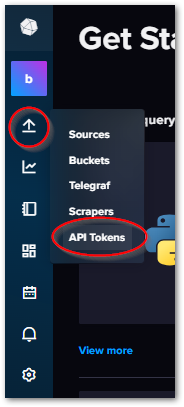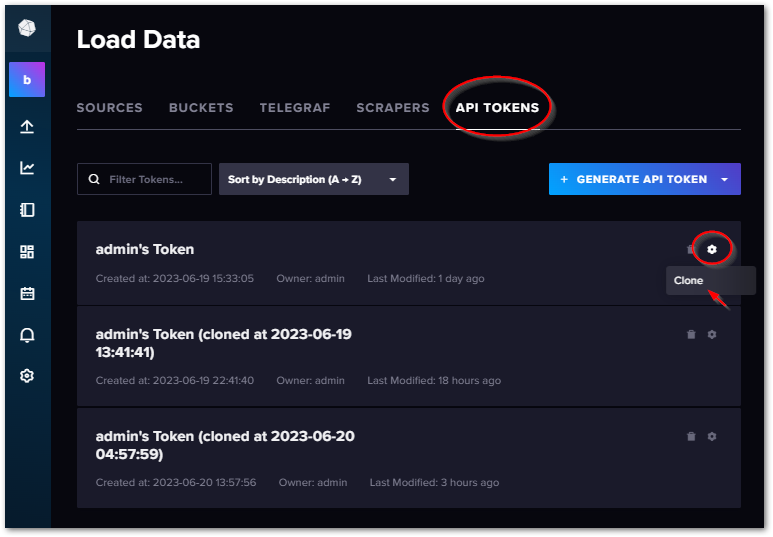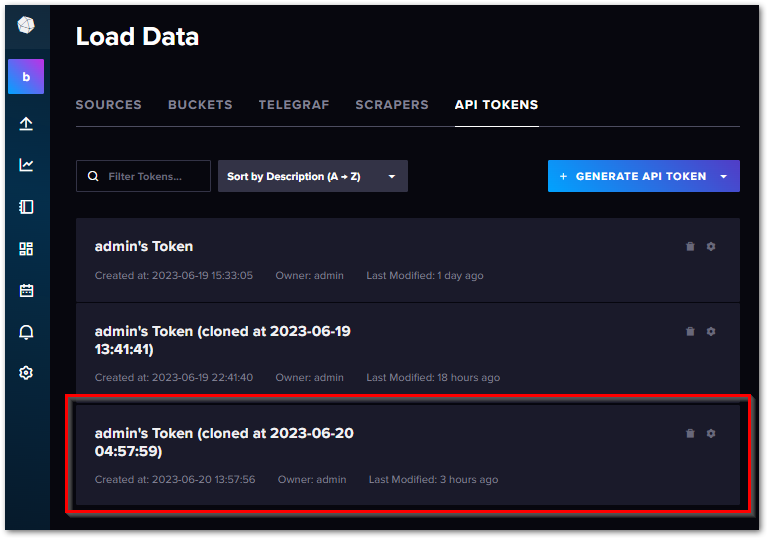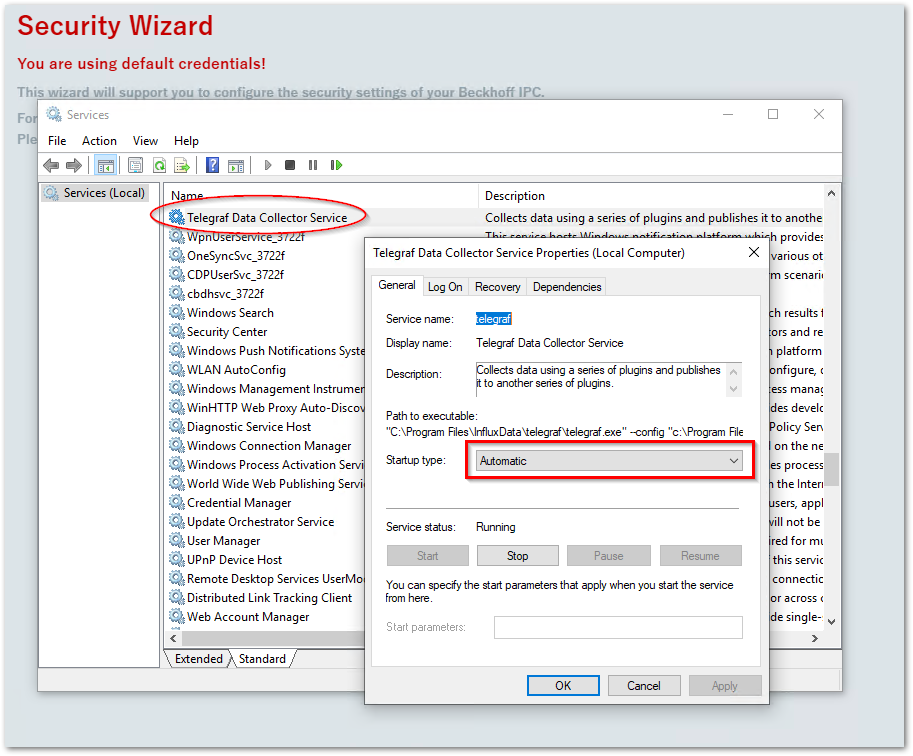付録:Telegraf を用いたIPCのWindowsメトリクス計測#
Windowsのパフォーマンスを計測するには、Performance monitorがありますが、基本的にWindowsのGUIアプリケーションや.NETのAPIなどを通じてデータ活用する必要があります。
InfluxDBには姉妹品としてTelegrafと呼ばれるエージェントがあり、Performance monitorで計測できるさまざまなカウンタ値をInfluxDBへ記録できます。
この節では、Windowsの診断情報をInfluxDBへ記録する方法について説明します。
IPCへのTelegrafのインストール#
注釈
telegrafは、Beckhoff IPC上にインストールします。telegrafはWindows上のさまざまな稼働データを収集して、influxDBへ記録する機能を果たします。
influxDBは別の専用サーバに設置していただく場合でも、telegrafはネットワーク経由でさまざまなメトリクスを記録することができます。よって、工場内の全てのIPCに本手順書によるtelegarfをインストールしておき、一か所のinfluxDBサーバへ記録させることで、全IPCの健康状態を監視することが可能になります。
InfluxData社からは、Telegrafと呼ばれるデータ収集エージェントが別途リリースされています。これを用いることで、IPCのWindowsやIPCのハードウェアに関する各種メトリクスを収集し、InfluxDBへ時系列記録させることができます。
https://portal.influxdata.com/downloads/にアクセスし、TelegrafのWindows binaries(64bit)を選択します。ここに現われたコマンド行2行をクリップボードコピーします。
wget https://dl.influxdata.com/telegraf/releases/telegraf-1.27.0_windows_amd64.zip -UseBasicParsing -OutFile telegraf-1.27.0_windows_amd64.zip Expand-Archive .\telegraf-1.27.0_windows_amd64.zip -DestinationPath 'C:\Program Files\InfluxData\telegraf'
警告
本節の手順ではtelegrafのバージョン1.27.0を例として説明します。以後、上記のinfluxdataのダウンロードサイトから得られる最新のバージョンに読み替えてください。
管理者権限でPowershellを開き、コピーしたコマンドを2行実行します。これによりインターネットからtelegrafをダウンロードし、
C:\Program Files\InfluxData\telegraf以下に展開します。influxDBのアクセストークンを発行します。この例では、adminユーザとしての権限でinfluxDBへアクセスするトークンを発行しますが、適切な権限に制限した一般ユーザのトークンを発行した方がセキュリティ上においても適切です。
Bucket設定メニューから
API Tokensを選択します。外部からアクセスしたい権限と同じ権限を持ったユーザの右側にある歯車アイコンをクリックし、
Cloneボタンを押します。API Tokenが表示されたウィンドウがポップアップされます。この文字列をクリップボードにコピーしてください。
登録が完了したら、最新のTokenが最下部に一覧されます。
警告
コピーする前にポップアップウィンドウ閉じたり、次の手順でAPI Tokenを定義ファイルに書き写す前にクリップボードから削除してしまった場合、API Tokenは二度と閲覧することはできません。一度ごみばこアイコンでTokenを削除して、再度同様の手順で作り直してください。
展開されたフォルダ内に生成された
telegraf.confファイルをテキストエディタで以下の要領で編集します。OUTPUT PLUGINS
telegrafからデータを出力する先に関する設定です。
セクション
キー
値
[[outputs.influxdb_v2]]urls
InfluxDBへアクセスするURL
token
前項で取得したAPI Tokenを設定します
organization
接続するinfluxDBのorganizaionを設定します。
bucket
接続するinfluxDBのbucketを設定します。
INPUT PLUGINS
telegrafで収集するデータ元に関する設定です。
セクション
キー
値
[[inputs.cpu]][[inputs.disk]][[inputs.diskio]][[inputs.kernel]][[inputs.mem]][[inputs.processes]][[inputs.swap]][[inputs.system]]全て
後述するwin_perf_countersで収集するため、こちらはコメントアウトして無効化する。
[[inputs.win_perf_counters]][[inputs.win_perf_counters.object]].Processer, LogicalDisk, PhysicalDisk, Network Interface, System, Memory, Paging fileデフォルト設定のままコメントを外して有効化。Windowsの基本的なパフォーマンスデータを収集。
追加
[[inputs.win_perf_counters.object]].ProcessInstancesで指定したプロセスのCPU使用率、メモリ使用量などのメトリクスを収集します。[[inputs.win_wmi]]コメントアウトを外して有効化。WMIで収集できるメトリクスを収集可能。ディスク使用量、残量などを収集。
以上を編集した後の例を以下のとおりunified diff形式で示します。
1--- C:/Users/Takashii/Documents/manual/TwinCATHowTo/source/influxdb/assets/telegraf.conf.org Tue Jun 20 17:44:29 2023 2+++ C:/Users/Takashii/Documents/manual/TwinCATHowTo/source/influxdb/assets/telegraf.conf Tue Jun 20 17:45:52 2023 3@@ -275,22 +275,22 @@ 4 5 6 # # Configuration for sending metrics to InfluxDB 2.0 7-# [[outputs.influxdb_v2]] 8+[[outputs.influxdb_v2]] 9 # ## The URLs of the InfluxDB cluster nodes. 10 # ## 11 # ## Multiple URLs can be specified for a single cluster, only ONE of the 12 # ## urls will be written to each interval. 13 # ## ex: urls = ["https://us-west-2-1.aws.cloud2.influxdata.com"] 14-# urls = ["http://127.0.0.1:8086"] 15+ urls = ["http://192.168.1.32:8086"] 16 # 17 # ## Token for authentication. 18-# token = "" 19+ token = "m4PbYq_vVRZDjbgRwyEF4BXPDpinq7CkBRX4JJnYNacbD6bSSLaF3AsDvip9vQfmF0A8ZpOlQHYBawCHf_X6-g==" 20 # 21 # ## Organization is the name of the organization you wish to write to. 22-# organization = "" 23+ organization = "beckhoff.co.jp" 24 # 25 # ## Destination bucket to write into. 26-# bucket = "" 27+ bucket = "machine_data" 28 # 29 # ## The value of this tag will be used to determine the bucket. If this 30 # ## tag is not set the 'bucket' option is used as the default. 31@@ -3786,95 +3786,95 @@ 32 ############################################################################### 33 34 35-# Read metrics about cpu usage 36-[[inputs.cpu]] 37- ## Whether to report per-cpu stats or not 38- percpu = true 39- ## Whether to report total system cpu stats or not 40- totalcpu = true 41- ## If true, collect raw CPU time metrics 42- collect_cpu_time = false 43- ## If true, compute and report the sum of all non-idle CPU states 44- report_active = false 45- ## If true and the info is available then add core_id and physical_id tags 46- core_tags = false 47- 48- 49-# Read metrics about disk usage by mount point 50-[[inputs.disk]] 51- ## By default stats will be gathered for all mount points. 52- ## Set mount_points will restrict the stats to only the specified mount points. 53- # mount_points = ["/"] 54- 55- ## Ignore mount points by filesystem type. 56- ignore_fs = ["tmpfs", "devtmpfs", "devfs", "iso9660", "overlay", "aufs", "squashfs"] 57- 58- ## Ignore mount points by mount options. 59- ## The 'mount' command reports options of all mounts in parathesis. 60- ## Bind mounts can be ignored with the special 'bind' option. 61- # ignore_mount_opts = [] 62- 63- 64-# Read metrics about disk IO by device 65-[[inputs.diskio]] 66- ## By default, telegraf will gather stats for all devices including 67- ## disk partitions. 68- ## Setting devices will restrict the stats to the specified devices. 69- ## NOTE: Globbing expressions (e.g. asterix) are not supported for 70- ## disk synonyms like '/dev/disk/by-id'. 71- # devices = ["sda", "sdb", "vd*", "/dev/disk/by-id/nvme-eui.00123deadc0de123"] 72- ## Uncomment the following line if you need disk serial numbers. 73- # skip_serial_number = false 74- # 75- ## On systems which support it, device metadata can be added in the form of 76- ## tags. 77- ## Currently only Linux is supported via udev properties. You can view 78- ## available properties for a device by running: 79- ## 'udevadm info -q property -n /dev/sda' 80- ## Note: Most, but not all, udev properties can be accessed this way. Properties 81- ## that are currently inaccessible include DEVTYPE, DEVNAME, and DEVPATH. 82- # device_tags = ["ID_FS_TYPE", "ID_FS_USAGE"] 83- # 84- ## Using the same metadata source as device_tags, you can also customize the 85- ## name of the device via templates. 86- ## The 'name_templates' parameter is a list of templates to try and apply to 87- ## the device. The template may contain variables in the form of '$PROPERTY' or 88- ## '${PROPERTY}'. The first template which does not contain any variables not 89- ## present for the device is used as the device name tag. 90- ## The typical use case is for LVM volumes, to get the VG/LV name instead of 91- ## the near-meaningless DM-0 name. 92- # name_templates = ["$ID_FS_LABEL","$DM_VG_NAME/$DM_LV_NAME"] 93- 94- 95-# Get kernel statistics from /proc/stat 96-# This plugin ONLY supports Linux 97-[[inputs.kernel]] 98- # no configuration 99- 100- 101-# Read metrics about memory usage 102-[[inputs.mem]] 103- # no configuration 104- 105- 106-# Get the number of processes and group them by status 107-# This plugin ONLY supports non-Windows 108-[[inputs.processes]] 109- ## Use sudo to run ps command on *BSD systems. Linux systems will read 110- ## /proc, so this does not apply there. 111- use_sudo = false 112- 113- 114-# Read metrics about swap memory usage 115-[[inputs.swap]] 116- # no configuration 117- 118- 119-# Read metrics about system load & uptime 120-[[inputs.system]] 121- # no configuration 122- 123- 124+# # Read metrics about cpu usage 125+# [[inputs.cpu]] 126+# ## Whether to report per-cpu stats or not 127+# percpu = true 128+# ## Whether to report total system cpu stats or not 129+# totalcpu = true 130+# ## If true, collect raw CPU time metrics 131+# collect_cpu_time = false 132+# ## If true, compute and report the sum of all non-idle CPU states 133+# report_active = false 134+# ## If true and the info is available then add core_id and physical_id tags 135+# core_tags = false 136+# 137+# 138+# # Read metrics about disk usage by mount point 139+# [[inputs.disk]] 140+# ## By default stats will be gathered for all mount points. 141+# ## Set mount_points will restrict the stats to only the specified mount points. 142+# # mount_points = ["/"] 143+# 144+# ## Ignore mount points by filesystem type. 145+# ignore_fs = ["tmpfs", "devtmpfs", "devfs", "iso9660", "overlay", "aufs", "squashfs"] 146+# 147+# ## Ignore mount points by mount options. 148+# ## The 'mount' command reports options of all mounts in parathesis. 149+# ## Bind mounts can be ignored with the special 'bind' option. 150+# # ignore_mount_opts = [] 151+# 152+# 153+# # Read metrics about disk IO by device 154+# [[inputs.diskio]] 155+# ## By default, telegraf will gather stats for all devices including 156+# ## disk partitions. 157+# ## Setting devices will restrict the stats to the specified devices. 158+# ## NOTE: Globbing expressions (e.g. asterix) are not supported for 159+# ## disk synonyms like '/dev/disk/by-id'. 160+# # devices = ["sda", "sdb", "vd*", "/dev/disk/by-id/nvme-eui.00123deadc0de123"] 161+# ## Uncomment the following line if you need disk serial numbers. 162+# # skip_serial_number = false 163+# # 164+# ## On systems which support it, device metadata can be added in the form of 165+# ## tags. 166+# ## Currently only Linux is supported via udev properties. You can view 167+# ## available properties for a device by running: 168+# ## 'udevadm info -q property -n /dev/sda' 169+# ## Note: Most, but not all, udev properties can be accessed this way. Properties 170+# ## that are currently inaccessible include DEVTYPE, DEVNAME, and DEVPATH. 171+# # device_tags = ["ID_FS_TYPE", "ID_FS_USAGE"] 172+# # 173+# ## Using the same metadata source as device_tags, you can also customize the 174+# ## name of the device via templates. 175+# ## The 'name_templates' parameter is a list of templates to try and apply to 176+# ## the device. The template may contain variables in the form of '$PROPERTY' or 177+# ## '${PROPERTY}'. The first template which does not contain any variables not 178+# ## present for the device is used as the device name tag. 179+# ## The typical use case is for LVM volumes, to get the VG/LV name instead of 180+# ## the near-meaningless DM-0 name. 181+# # name_templates = ["$ID_FS_LABEL","$DM_VG_NAME/$DM_LV_NAME"] 182+# 183+# 184+# # Get kernel statistics from /proc/stat 185+# # This plugin ONLY supports Linux 186+# [[inputs.kernel]] 187+# # no configuration 188+# 189+# 190+# # Read metrics about memory usage 191+# [[inputs.mem]] 192+# # no configuration 193+# 194+# 195+# # Get the number of processes and group them by status 196+# # This plugin ONLY supports non-Windows 197+# [[inputs.processes]] 198+# ## Use sudo to run ps command on *BSD systems. Linux systems will read 199+# ## /proc, so this does not apply there. 200+# #use_sudo = false 201+# 202+# 203+# # Read metrics about swap memory usage 204+# [[inputs.swap]] 205+# # no configuration 206+# 207+# 208+# # Read metrics about system load & uptime 209+# [[inputs.system]] 210+# # no configuration 211+# 212+# 213 # # Gather ActiveMQ metrics 214 # [[inputs.activemq]] 215 # ## ActiveMQ WebConsole URL 216@@ -8511,141 +8511,149 @@ 217 218 # # # Input plugin to counterPath Performance Counters on Windows operating systems 219 # # # This plugin ONLY supports Windows 220-# # [[inputs.win_perf_counters]] 221-# # ## By default this plugin returns basic CPU and Disk statistics. 222-# # ## See the README file for more examples. 223-# # ## Uncomment examples below or write your own as you see fit. If the system 224-# # ## being polled for data does not have the Object at startup of the Telegraf 225-# # ## agent, it will not be gathered. 226-# # ## Settings: 227-# # # PrintValid = false # Print All matching performance counters 228-# # # Whether request a timestamp along with the PerfCounter data or just use current time 229-# # # UsePerfCounterTime=true 230-# # # If UseWildcardsExpansion params is set to true, wildcards (partial wildcards in instance names and wildcards in counters names) in configured counter paths will be expanded 231-# # # and in case of localized Windows, counter paths will be also localized. It also returns instance indexes in instance names. 232-# # # If false, wildcards (not partial) in instance names will still be expanded, but instance indexes will not be returned in instance names. 233-# # #UseWildcardsExpansion = false 234-# # # When running on a localized version of Windows and with UseWildcardsExpansion = true, Windows will 235-# # # localize object and counter names. When LocalizeWildcardsExpansion = false, use the names in object.Counters instead 236-# # # of the localized names. Only Instances can have wildcards in this case. ObjectName and Counters must not have wildcards when this 237-# # # setting is false. 238-# # #LocalizeWildcardsExpansion = true 239-# # # Period after which counters will be reread from configuration and wildcards in counter paths expanded 240-# # CountersRefreshInterval="1m" 241-# # ## Accepts a list of PDH error codes which are defined in pdh.go, if this error is encountered it will be ignored 242-# # ## For example, you can provide "PDH_NO_DATA" to ignore performance counters with no instances 243-# # ## By default no errors are ignored 244-# # ## You can find the list here: https://github.com/influxdata/telegraf/blob/master/plugins/inputs/win_perf_counters/pdh.go 245-# # ## e.g.: IgnoredErrors = ["PDH_NO_DATA"] 246-# # # IgnoredErrors = [] 247-# # 248-# # [[inputs.win_perf_counters.object]] 249-# # # Processor usage, alternative to native, reports on a per core. 250-# # ObjectName = "Processor" 251-# # Instances = ["*"] 252-# # Counters = [ 253-# # "% Idle Time", 254-# # "% Interrupt Time", 255-# # "% Privileged Time", 256-# # "% User Time", 257-# # "% Processor Time", 258-# # "% DPC Time", 259-# # ] 260-# # Measurement = "win_cpu" 261-# # # Set to true to include _Total instance when querying for all (*). 262-# # # IncludeTotal=false 263-# # # Print out when the performance counter is missing from object, counter or instance. 264-# # # WarnOnMissing = false 265-# # # Gather raw values instead of formatted. Raw value is stored in the field name with the "_Raw" suffix, e.g. "Disk_Read_Bytes_sec_Raw". 266-# # # UseRawValues = true 267-# # 268-# # [[inputs.win_perf_counters.object]] 269-# # # Disk times and queues 270-# # ObjectName = "LogicalDisk" 271-# # Instances = ["*"] 272-# # Counters = [ 273-# # "% Idle Time", 274-# # "% Disk Time", 275-# # "% Disk Read Time", 276-# # "% Disk Write Time", 277-# # "% User Time", 278-# # "% Free Space", 279-# # "Current Disk Queue Length", 280-# # "Free Megabytes", 281-# # ] 282-# # Measurement = "win_disk" 283-# # 284-# # [[inputs.win_perf_counters.object]] 285-# # ObjectName = "PhysicalDisk" 286-# # Instances = ["*"] 287-# # Counters = [ 288-# # "Disk Read Bytes/sec", 289-# # "Disk Write Bytes/sec", 290-# # "Current Disk Queue Length", 291-# # "Disk Reads/sec", 292-# # "Disk Writes/sec", 293-# # "% Disk Time", 294-# # "% Disk Read Time", 295-# # "% Disk Write Time", 296-# # ] 297-# # Measurement = "win_diskio" 298-# # 299-# # [[inputs.win_perf_counters.object]] 300-# # ObjectName = "Network Interface" 301-# # Instances = ["*"] 302-# # Counters = [ 303-# # "Bytes Received/sec", 304-# # "Bytes Sent/sec", 305-# # "Packets Received/sec", 306-# # "Packets Sent/sec", 307-# # "Packets Received Discarded", 308-# # "Packets Outbound Discarded", 309-# # "Packets Received Errors", 310-# # "Packets Outbound Errors", 311-# # ] 312-# # Measurement = "win_net" 313-# # 314-# # 315-# # [[inputs.win_perf_counters.object]] 316-# # ObjectName = "System" 317-# # Counters = [ 318-# # "Context Switches/sec", 319-# # "System Calls/sec", 320-# # "Processor Queue Length", 321-# # "System Up Time", 322-# # ] 323-# # Instances = ["------"] 324-# # Measurement = "win_system" 325-# # 326-# # [[inputs.win_perf_counters.object]] 327-# # # Example counterPath where the Instance portion must be removed to get data back, 328-# # # such as from the Memory object. 329-# # ObjectName = "Memory" 330-# # Counters = [ 331-# # "Available Bytes", 332-# # "Cache Faults/sec", 333-# # "Demand Zero Faults/sec", 334-# # "Page Faults/sec", 335-# # "Pages/sec", 336-# # "Transition Faults/sec", 337-# # "Pool Nonpaged Bytes", 338-# # "Pool Paged Bytes", 339-# # "Standby Cache Reserve Bytes", 340-# # "Standby Cache Normal Priority Bytes", 341-# # "Standby Cache Core Bytes", 342-# # ] 343-# # Instances = ["------"] # Use 6 x - to remove the Instance bit from the counterPath. 344-# # Measurement = "win_mem" 345-# # 346-# # [[inputs.win_perf_counters.object]] 347-# # # Example query where the Instance portion must be removed to get data back, 348-# # # such as from the Paging File object. 349-# # ObjectName = "Paging File" 350-# # Counters = [ 351-# # "% Usage", 352-# # ] 353-# # Instances = ["_Total"] 354-# # Measurement = "win_swap" 355+[[inputs.win_perf_counters]] 356+ ## By default this plugin returns basic CPU and Disk statistics. 357+ ## See the README file for more examples. 358+ ## Uncomment examples below or write your own as you see fit. If the system 359+ ## being polled for data does not have the Object at startup of the Telegraf 360+ ## agent, it will not be gathered. 361+ ## Settings: 362+ # PrintValid = false # Print All matching performance counters 363+ # Whether request a timestamp along with the PerfCounter data or just use current time 364+ # UsePerfCounterTime=true 365+ # If UseWildcardsExpansion params is set to true, wildcards (partial wildcards in instance names and wildcards in counters names) in configured counter paths will be expanded 366+ # and in case of localized Windows, counter paths will be also localized. It also returns instance indexes in instance names. 367+ # If false, wildcards (not partial) in instance names will still be expanded, but instance indexes will not be returned in instance names. 368+ #UseWildcardsExpansion = false 369+ # When running on a localized version of Windows and with UseWildcardsExpansion = true, Windows will 370+ # localize object and counter names. When LocalizeWildcardsExpansion = false, use the names in object.Counters instead 371+ # of the localized names. Only Instances can have wildcards in this case. ObjectName and Counters must not have wildcards when this 372+ # setting is false. 373+ #LocalizeWildcardsExpansion = true 374+ # Period after which counters will be reread from configuration and wildcards in counter paths expanded 375+ CountersRefreshInterval="1m" 376+ ## Accepts a list of PDH error codes which are defined in pdh.go, if this error is encountered it will be ignored 377+ ## For example, you can provide "PDH_NO_DATA" to ignore performance counters with no instances 378+ ## By default no errors are ignored 379+ ## You can find the list here: https://github.com/influxdata/telegraf/blob/master/plugins/inputs/win_perf_counters/pdh.go 380+ ## e.g.: IgnoredErrors = ["PDH_NO_DATA"] 381+ # IgnoredErrors = [] 382+ 383+ [[inputs.win_perf_counters.object]] 384+ # Processor usage, alternative to native, reports on a per core. 385+ ObjectName = "Processor" 386+ Instances = ["*"] 387+ Counters = [ 388+ "% Idle Time", 389+ "% Interrupt Time", 390+ "% Privileged Time", 391+ "% User Time", 392+ "% Processor Time", 393+ "% DPC Time", 394+ ] 395+ Measurement = "win_cpu" 396+ # Set to true to include _Total instance when querying for all (*). 397+ # IncludeTotal=false 398+ # Print out when the performance counter is missing from object, counter or instance. 399+ # WarnOnMissing = false 400+ # Gather raw values instead of formatted. Raw value is stored in the field name with the "_Raw" suffix, e.g. "Disk_Read_Bytes_sec_Raw". 401+ # UseRawValues = true 402+ 403+ [[inputs.win_perf_counters.object]] 404+ # Disk times and queues 405+ ObjectName = "LogicalDisk" 406+ Instances = ["*"] 407+ Counters = [ 408+ "% Idle Time", 409+ "% Disk Time", 410+ "% Disk Read Time", 411+ "% Disk Write Time", 412+ "% User Time", 413+ "% Free Space", 414+ "Current Disk Queue Length", 415+ "Free Megabytes", 416+ ] 417+ Measurement = "win_disk" 418+ 419+ [[inputs.win_perf_counters.object]] 420+ ObjectName = "PhysicalDisk" 421+ Instances = ["*"] 422+ Counters = [ 423+ "Disk Read Bytes/sec", 424+ "Disk Write Bytes/sec", 425+ "Current Disk Queue Length", 426+ "Disk Reads/sec", 427+ "Disk Writes/sec", 428+ "% Disk Time", 429+ "% Disk Read Time", 430+ "% Disk Write Time", 431+ ] 432+ Measurement = "win_diskio" 433+ 434+ [[inputs.win_perf_counters.object]] 435+ ObjectName = "Network Interface" 436+ Instances = ["*"] 437+ Counters = [ 438+ "Bytes Received/sec", 439+ "Bytes Sent/sec", 440+ "Packets Received/sec", 441+ "Packets Sent/sec", 442+ "Packets Received Discarded", 443+ "Packets Outbound Discarded", 444+ "Packets Received Errors", 445+ "Packets Outbound Errors", 446+ ] 447+ Measurement = "win_net" 448+ 449+ 450+ [[inputs.win_perf_counters.object]] 451+ ObjectName = "System" 452+ Counters = [ 453+ "Context Switches/sec", 454+ "System Calls/sec", 455+ "Processor Queue Length", 456+ "System Up Time", 457+ ] 458+ Instances = ["------"] 459+ Measurement = "win_system" 460+ 461+ [[inputs.win_perf_counters.object]] 462+ # Example counterPath where the Instance portion must be removed to get data back, 463+ # such as from the Memory object. 464+ ObjectName = "Memory" 465+ Counters = [ 466+ "Available Bytes", 467+ "Cache Faults/sec", 468+ "Demand Zero Faults/sec", 469+ "Page Faults/sec", 470+ "Pages/sec", 471+ "Transition Faults/sec", 472+ "Pool Nonpaged Bytes", 473+ "Pool Paged Bytes", 474+ "Standby Cache Reserve Bytes", 475+ "Standby Cache Normal Priority Bytes", 476+ "Standby Cache Core Bytes", 477+ ] 478+ Instances = ["------"] # Use 6 x - to remove the Instance bit from the counterPath. 479+ Measurement = "win_mem" 480+ 481+ [[inputs.win_perf_counters.object]] 482+ # Example query where the Instance portion must be removed to get data back, 483+ # such as from the Paging File object. 484+ ObjectName = "Paging File" 485+ Counters = [ 486+ "% Usage", 487+ ] 488+ Instances = ["_Total"] 489+ Measurement = "win_swap" 490+ 491+ [[inputs.win_perf_counters.object]] 492+ # Process metrics, in this case for IIS only 493+ ObjectName = "Process" 494+ Counters = ["% Processor Time","Handle Count","Private Bytes","Thread Count","Virtual Bytes","Working Set"] 495+ Instances = ["TcSysUI", "TCATSysSrv", "TcNcI", "TcHmiSrv", "TF6420Server"] 496+ Measurement = "win_proc" 497+ #IncludeTotal=false #Set to true to include _Total instance when querying for all (*). 498 499 500 # # Input plugin to report Windows services info. 501@@ -8660,20 +8668,21 @@ 502 # excluded_service_names = ['WinRM'] # optional, list of service names to exclude 503 504 505-# # Input plugin to query Windows Management Instrumentation 506-# # This plugin ONLY supports Windows 507-# [[inputs.win_wmi]] 508-# [[inputs.win_wmi.query]] 509-# # a string representing the WMI namespace to be queried 510-# namespace = "root\\cimv2" 511-# # a string representing the WMI class to be queried 512-# class_name = "Win32_Volume" 513-# # an array of strings representing the properties of the WMI class to be queried 514-# properties = ["Name", "Capacity", "FreeSpace"] 515-# # a string specifying a WHERE clause to use as a filter for the WQL 516-# filter = 'NOT Name LIKE "\\\\?\\%"' 517-# # WMI class properties which should be considered tags instead of fields 518-# tag_properties = ["Name"] 519+# Input plugin to query Windows Management Instrumentation 520+# This plugin ONLY supports Windows 521+[[inputs.win_wmi]] 522+ [[inputs.win_wmi.query]] 523+ # a string representing the WMI namespace to be queried 524+ namespace = "root\\cimv2" 525+ # a string representing the WMI class to be queried 526+ class_name = "Win32_Volume" 527+ # an array of strings representing the properties of the WMI class to be queried 528+ properties = ["Name", "Capacity", "FreeSpace"] 529+ # a string specifying a WHERE clause to use as a filter for the WQL 530+ filter = 'NOT Name LIKE "\\\\?\\%"' 531+ # WMI class properties which should be considered tags instead of fields 532+ tag_properties = ["Name"] 533+ 534 535 536 # # Collect Wireguard server interface and peer statistics
再度管理者権限で実行されたPowershell内で、以下のコマンドを実行します。
PS> C:\Program Files\InfluxData\telegraf\telegraf-1.27.0\telegraf.exe --service install --config "C:\Program Files\InfluxData\telegraf\telegraf-1.27.0\telegraf.conf" PS> net telegraf start
以上の設定により、IPC上のサービスに自動的に登録されたtelegrafにより収集されたWindowsのメトリクスを、telegraf.confに設定したinfluxDBサーバに10秒おきに登録されます。この機能は、以後、IPC起動時にサービス設定により自動起動します。




